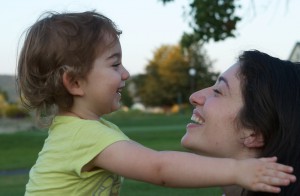Editor’s note: This post was originally published on Oct. 9, 2008, and in the past 7 years since, workplaces are increasingly becoming more family friendly, including allowing employees to bring their babies to work with them.
By Carla Moquin, president of the Parenting in the Workplace Institute
 For many working parents, their desire to be present for their children is at its most visceral when they return to work weeks or months after their baby’s birth and leave their baby in the care of others for dozens of hours each week. Our society — and many others — assumes that this separation is a necessity of our modern world. After all, the workplace is “for business,” and the home is where we “should” care for our children — not to mention that most people assume that babies would cry all the time if their parents actually tried to bring them to work.
For many working parents, their desire to be present for their children is at its most visceral when they return to work weeks or months after their baby’s birth and leave their baby in the care of others for dozens of hours each week. Our society — and many others — assumes that this separation is a necessity of our modern world. After all, the workplace is “for business,” and the home is where we “should” care for our children — not to mention that most people assume that babies would cry all the time if their parents actually tried to bring them to work.
But more than 100 baby-friendly organizations around the country — and more than 1,300 babies — are proving these assumptions wrong. And at the same time, they are illustrating how socially sensitive babies are and how much they crave being part of our communal interactions.
By nature, we are highly social beings, even from birth. Babies prefer nothing more than looking at and interacting with other people. They want to be part of a community, to feel involved in our activities and to know that they are loved, safe and secure. When we meet those needs, healthy babies have no reason to cry: They have everything they need to be content.
Baby-friendly companies have seen this dynamic firsthand. Numerous managers and coworkers in these companies have commented that they were amazed at how happy babies at work have been — and that these babies could spend hours contentedly watching other people in the workplace.
Most of these companies explicitly tell parents that their babies’ needs come first while at work, and most parents instinctively respond quickly to their babies simply out of the practical need to avoid disturbing coworkers. This dynamic greatly contributes to the happiness and calm of babies at work.
And since babies of highly-responsive parents cry less, these parents have more available time and focus to get their jobs done in spite of having their baby with them.
An unexpected effect of these programs is the “village parenting” effect that has developed in all of them. In every baby-friendly company, many coworkers end up developing bonds with the babies in their vicinity, and they welcome the opportunity to hold or play with a baby for brief periods. This includes many people who were resistant to the idea of a baby program in the first place.
Babies at work don’t just have the presence and support of their parents. They actually end up with a social network of many caring adults who feel invested in their well-being. Babies seem to bring out our nurturing instincts, which makes sense given the communal nature of our species. For most of human history, we lived in integrated social groups in which many community members shared the efforts and rewards of child rearing and in which work and family were one and the same. Our species is actually hard-wired to respond positively to babies. Research has found that simply seeing a baby’s face — as opposed to the faces of older children or adults — triggers a “sense of reward and good feeling” in just 1/7th of a second.
Baby-friendly companies have learned firsthand that babies — and older children — thrive when we integrate them into our day-to-day world. They illustrate that we as a community benefit when we are present for our children and, perhaps most significantly, when we give our children the chance to be present with us.









